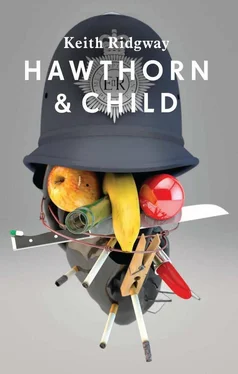I was suddenly in love with terrorism.
The Spectacular. It was both means and end. For what was it I was looking for if not a spectacular? What had my campaign of earnest, un-showy literature achieved? Nothing. Here I stood, in the drunken middle of my life, with no money, no wife, no children, no achievements — apart from the mild respect of a tiny group of critics and reviewers and writers conducting a conversation that no one was listening to but themselves. I needed to plant a bomb. I needed to explode.
A literary device.
There would be no pseudonym. This was something I should own. That was the point. Something to which my name was affixed. Clive Drayton. The man whose success — whose spectacular success — drew the world to his previously overlooked writing, which connected him, explosively, to a readership. Globally.
And the means too had come courtesy of Will’s surprising ferocity. He had altered not just my thoughts about what it was that I was trying to do, but how I could go about doing it. I would not waste my time with mere crime. With serial killers and their awful, dreary, masturbatory killings. With the identikit men who track them down. Why add to that miserable pile? I needed to think on a larger scale. I would not kill one or two, I would kill hundreds, thousands. I would show no fear, I would have no compunction. I would be — in an abdication of Englishness, a subversion of my own nature — merciless.
My thoughts — like hijacked planes — flew in many directions at once.
The change in me was startling. I became organized. I decided to stop drinking. I plotted out my days, dividing them up into the hours I needed for The Spectacular, and sleep. There would be nothing else.
Reverse engineer it. What does the terrorist want to do? Not achieve, do . The target. Decide on it, then obscure it. Sleeper cell. Fundamentalist. Cut-out. Rogue. Mercenary. Special ops, black ops, renegade. Deep fold. Al Qaeda. Russia. North Korea. Iran. American corporate interests. Oil. Halliburton. C.I.A. Downing Street. MI5. MI6. It didn’t really matter. A nebulous conspiracy of malign human agency involving all of them, each of them playing the other, none of them recognizing the subtleties of the plot as the techniques of fiction until it is too late. The fear.
I sat in the British Library and read my way through the intricate structures of protection and paranoia created since 9/11. Since 7/7. I read the awkwardly ill-fitting testimony of the principals and saw the harder truth — that they were not at the centre of things. Where the real tangled evil lurked was in the trail of emails and phone calls to and from Pakistan, or Indonesia; the labyrinthine progress of certain sums of dirty money over virtual space and real time; the erratic, often inexplicable movements of men known only by a letter or a playground nickname, from Sudan to Somalia, to Frankfurt or Marseilles, from Islamabad to Bradford.
Imagine it. Three men, say. A recondite and fragmented conversation crackling across untraceable phones and between fleeting, temporary nodes of the internet. This conversation — impenetrable even to aspects of the mens’ own psychology — influenced and affected both deliberately and accidentally and who-the-hell-knows by outside parties, eavesdroppers, the devil — turns its sum focus on that fragile packet of humanity self-importantly buzzing its way over the rolling ground beneath Crouch Hill.
I began to think about what it was I should blow up.
God it was fun. Bombs in suitcases on densely packed tube trains. Airports and bridges and underground railways. I studied these things. How much fertilizer would it take to collapse Piccadilly Circus station? How did you make it? What was that hairspray that they all seemed to buy in bulk? What could you do with it? Where could you go in London with several heavy cases? Pretty much anywhere. Where were the busiest places, when were they busy, with what sorts of people?
Something was bothering me. Something in the periphery of my vision. I looked around the British Library, Parliament Square, Waterloo. I sat on trains and buses and read the security notices and clicked my camera-phone at policemen and barriers and supporting beams. There was something I was missing. And it was only in front of the television — blender of thought — that I remembered. Another tired evening at Mr Malik’s desk, the television at my back, and the presenter annoying me as she intoned for the umpteenth time the officially bright and positive message about the regeneration of the east end, and the building of the magnificent stadium, and the wonder of the athlete’s village. I had heard it so often that I had forgotten it. The Olympics were coming to London.
The Olympics. London. 2012. The bloody Olympics.
The Bloody Olympics.
A conversation. In a small house in Cairo. One man sips lemon tea, the other fidgets nervously. They speak of patience, resilience, strength. Of making the necessary alignments, of putting into place the delicate cogs of a complicated, sophisticated machine. The tea drinker is calm. He carefully watches the twitches of the other man, who is not.
Beijing. 2008. The body of the International Olympic Committee’s Deputy Security Consultant Björn Arnfeldt is found hanging in his room on the 38th floor of the Park Hyatt Hotel. It looks like suicide, but an observant policeman detects signs of a struggle, and a look of terror on the face of the dead Swede which suggest otherwise. But the Olympics have been a triumph. There can be no room for intrigue or scandal. China’s reputation is at stake. Murder is impossible. Suicide is the immediate, official verdict.
New York. Present day. The morning commuter train from New Haven, due at Grand Central at 8:24, is running two minutes late. On it, in the last carriage, there is a woman and her three children, returning from a visit to her sister’s place upstate. Her eldest, Molly, aged 8, stares at the sweating man who is standing by the luggage rack. The man keeps on looking at his suitcase. Molly nudges her mother, points at the man. But her mother scolds her. It’s rude to stare. Further up the train there are similar sweating men in charge of similar, bulky, heavy suitcases. One of them looks repeatedly at his watch. Another, in the first carriage, sits with his eyes closed and his lips almost imperceptibly moving, the suitcase at his back. He is surrounded by businessmen and women making the first calls of the day, checking the markets in London, putting the finishing touches to PowerPoint presentations and last month’s sales figures.
As the train pulls into the station, Molly notices that the sweating man, unlike everyone else, makes no preparations to disembark. In the centre of the train the other sweating man suddenly kicks at the door. He is panicked. He is terrified. He has changed his mind. Hey. Hey buddy! Easy! What you trying to do? It’s then, in the look he gives his fellow passengers, in the glance he can’t help directing towards the suitcase, that people begin to realize that something is wrong. Very wrong. Molly hears the shouting from further up the train. She turns to her mother, determined to make her listen. A flicker of dark silence. All three bombs detonate simultaneously. The power of the explosion is enough to pulverize the train completely and to collapse the pillars along the length of the platform. Above, the shape of Grand Central Station changes. The famous windows shatter. The floor ruptures. The 59 storey Met Life building shakes and sways overhead. People on the top levels are convinced that it’s about to fall. It doesn’t. There is a pock-marked quiet. A plume of smoke rises from the heart of Manhattan.
London. Afternoon. A journalist sits in a café, writing on a laptop. She glances at the news on the television. Something’s happened in New York. Again. She rushes to the office. On her mobile she calls her boyfriend. The policeman.
Читать дальше












